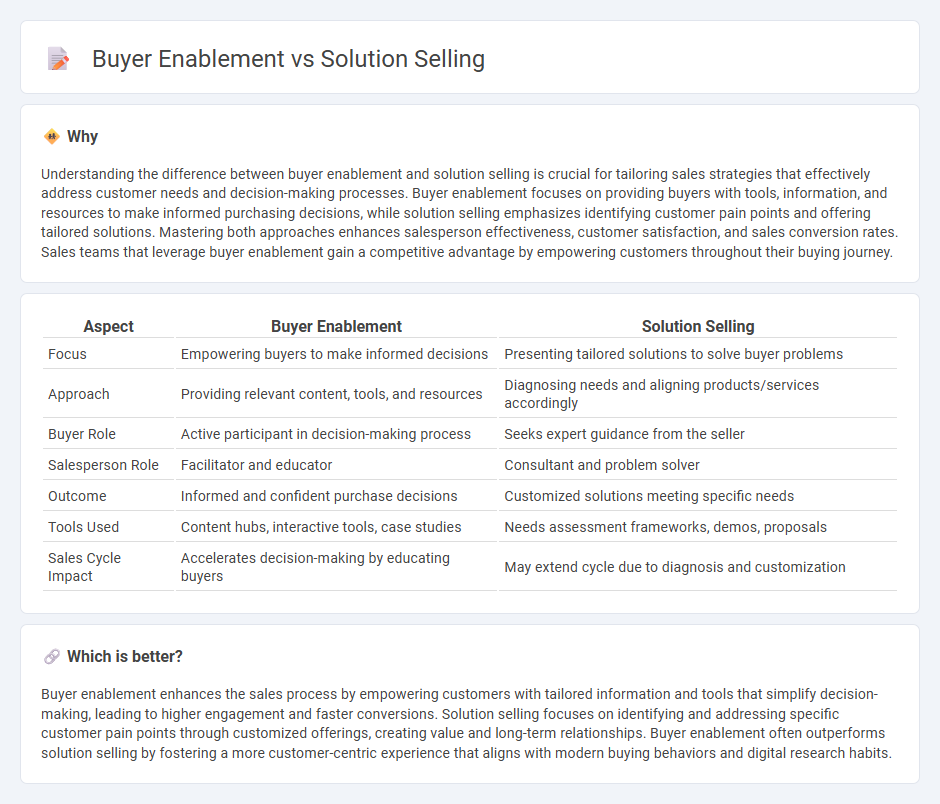
Buyer enablement centers on empowering customers with the information and tools needed to make informed purchasing decisions, enhancing their confidence and satisfaction throughout the sales process. Solution selling focuses on identifying specific customer challenges and tailoring products or services to address those unique needs, driving value and long-term relationships. Explore the differences between buyer enablement and solution selling to optimize your sales strategy and improve customer engagement.
Why it is important
Understanding the difference between buyer enablement and solution selling is crucial for tailoring sales strategies that effectively address customer needs and decision-making processes. Buyer enablement focuses on providing buyers with tools, information, and resources to make informed purchasing decisions, while solution selling emphasizes identifying customer pain points and offering tailored solutions. Mastering both approaches enhances salesperson effectiveness, customer satisfaction, and sales conversion rates. Sales teams that leverage buyer enablement gain a competitive advantage by empowering customers throughout their buying journey.
Comparison Table
| Aspect | Buyer Enablement | Solution Selling |
|---|---|---|
| Focus | Empowering buyers to make informed decisions | Presenting tailored solutions to solve buyer problems |
| Approach | Providing relevant content, tools, and resources | Diagnosing needs and aligning products/services accordingly |
| Buyer Role | Active participant in decision-making process | Seeks expert guidance from the seller |
| Salesperson Role | Facilitator and educator | Consultant and problem solver |
| Outcome | Informed and confident purchase decisions | Customized solutions meeting specific needs |
| Tools Used | Content hubs, interactive tools, case studies | Needs assessment frameworks, demos, proposals |
| Sales Cycle Impact | Accelerates decision-making by educating buyers | May extend cycle due to diagnosis and customization |
Which is better?
Buyer enablement enhances the sales process by empowering customers with tailored information and tools that simplify decision-making, leading to higher engagement and faster conversions. Solution selling focuses on identifying and addressing specific customer pain points through customized offerings, creating value and long-term relationships. Buyer enablement often outperforms solution selling by fostering a more customer-centric experience that aligns with modern buying behaviors and digital research habits.
Connection
Buyer enablement enhances the purchasing process by providing buyers with the right tools, information, and support to make informed decisions, which aligns directly with solution selling's focus on addressing specific customer needs. Solution selling relies on understanding the buyer's challenges and tailoring products or services accordingly, making buyer enablement crucial for uncovering these pain points and delivering customized value. Both strategies improve sales effectiveness by fostering collaboration and trust, leading to higher conversion rates and long-term customer relationships.
Key Terms
**Solution Selling:**
Solution selling emphasizes understanding customer challenges and tailoring products to solve specific business problems, driving value through personalized recommendations. This approach relies on in-depth discovery, consultative dialogue, and aligning product features with customer needs to close deals effectively. Explore more ways solution selling transforms customer engagement and boosts sales performance.
Needs Analysis
Solution selling centers on comprehensive needs analysis by diagnosing customer pain points to tailor product offerings that resolve specific challenges. Buyer enablement streamlines the purchasing process, equipping buyers with relevant information and tools to make informed decisions aligned with their requirements. Discover how mastering needs analysis enhances both strategies to boost sales effectiveness and customer satisfaction.
Customization
Solution selling emphasizes tailoring products to meet specific client needs, ensuring that solutions address unique business challenges through customization. Buyer enablement focuses on empowering customers with tailored information and tools that facilitate informed decision-making, customized to their individual buying journey. Discover how customizing approaches in both strategies drives better sales outcomes and enhances buyer experience.
Source and External Links
Solution Selling vs. Consultative Selling: Key Differences - Solution selling identifies specific client problems and offers tailored product solutions to address those challenges directly.
Solution Selling: What It Is & How to Do It Effectively - Solution selling is a sales methodology focused on holistically understanding a prospect's needs and recommending products or services that best solve their unique problems.
Solution selling definition and techniques: The complete guide - Solution selling requires salespeople to deeply understand customer pain points and recommend solutions, rather than pushing a generic product regardless of the prospect's actual needs.
 dowidth.com
dowidth.com